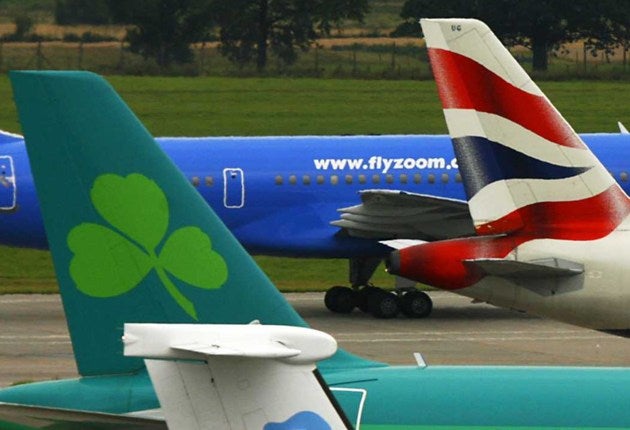Turbulence for owners of foreign property
Low-cost airlines have opened up new property markets, but what happens if they go bust?

Your support helps us to tell the story
From reproductive rights to climate change to Big Tech, The Independent is on the ground when the story is developing. Whether it's investigating the financials of Elon Musk's pro-Trump PAC or producing our latest documentary, 'The A Word', which shines a light on the American women fighting for reproductive rights, we know how important it is to parse out the facts from the messaging.
At such a critical moment in US history, we need reporters on the ground. Your donation allows us to keep sending journalists to speak to both sides of the story.
The Independent is trusted by Americans across the entire political spectrum. And unlike many other quality news outlets, we choose not to lock Americans out of our reporting and analysis with paywalls. We believe quality journalism should be available to everyone, paid for by those who can afford it.
Your support makes all the difference.Five years ago, it was easy to predict where the hot property markets would be – you simply had to keep an eye on new airline routes. From Eastern Europe to South America, each time a low-cost or charter company announced that it was launching a service to some previously unknown or unaffordable destination, there was a rush to promote property there.
Investors were encouraged to sink funds into the Caribbean and Florida or obscure corners of France and Italy on the back of cheap and plentiful air travel. Buy-to-letters were enticed to cash in on bargain flights and the predicted wave of tourism such services would also bring. Even if a location was served by only one flight a day, estate agents often claimed this was a sign the destination was up-and-coming.
Then, earlier this year, it all started to go wrong. Rising fuel prices and a decline in passenger numbers have created an unprecedented crisis for the aviation sector. Most carriers have been forced to withdraw routes or reduce services, while the industry has been rocked by XL and Zoom going bust and the news that Alitalia is on the brink of collapse – leaving not just holidaymakers but second homeowners high and dry.
And things may get worse, according to Toby Nichol of easyJet. "A difficult winter is predicted and we are likely to see more companies exit the market," he says, adding that this will also reduce the number of available destinations. "The first routes to go will be the marginally profitable, which may include areas where there is no natural demand – places people visit only because fares have been low."
By this, Nichol means locations away from main cities or big beach resorts – all of which can be a bit of a blow if you bought your rural home on the basis that the location was served by at least one airline. Rodez in south-western France is served from Britain only by Ryanair, as are several other European destinations. The Irish no-frills carrier recently slashed its winter timetables to the region, creating problems for property owners who now face much longer journeys and a drop in tourist traffic.
Linda Travella, an international spokeswoman for the National Association of Estate Agents, does not think the situation is "as bad as portrayed" but agrees that it might make buyers more cautious. "Rather than buying somewhere rural or isolated on the back of one service, homeowners should choose locations served by more than one carrier, or where there are other easily accessible airports," she says. "You should also check if there is a reliable train service or even if you can drive there if necessary." Travella strongly advises buying within easy reach of major airport hubs, adding: "Key airports such as Malaga, Nice, Milan or Barcelona, for example, will always be safe."
Her opinion is echoed by Karen Tait, the editor of French Property News, whose readers are mainly buyers of second homes. "Cheap flights have really opened up France to homeowners but whether those routes remain available in the long term is always a concern," she says. "We advise readers to buy in areas that are not dependent on just one airline. That way you keep your options open."
Although Tait has not seen any undue panic from homeowners, she admits that if confidence in airlines is eroded, buyers may consider locations nearer to home. "They might start looking at areas within an easy drive of the Channel ports, for example, or those which are accessible via train."
The issues are tougher for people who bought in long-haul destinations, with industry insiders predicting an end to cheap flights to destinations in America and the Caribbean. Buyers in exotic locations supplied by limited flights should also be concerned.
For example, the major charter carrier Thomson recently withdrew its flights to a much-publicised "hot spot" – Natal in Brazil – owing to lack of demand, leaving only more expensive schedule options. Cape Verde and the Caribbean island of Margarita also rely heavily on charter services, which could be threatened if demand eases.
So how do you know if a route is at risk? Toby Nichol says that airlines may give a route only two to three years to see if it works and scrap it if it is not profitable. Therefore, you should not base important decisions such as buying property purely on the availability of flights, especially to a little-known region with limited transport options.
"If you need a geography lesson to find the place, you probably should be wary of buying there," he says. "Airlines may move on after a few years and you could be left with a depreciating asset."
Join our commenting forum
Join thought-provoking conversations, follow other Independent readers and see their replies
Comments